Fishing News
A powerful new consortium has been formed to help protect threatened tuna in the Eastern Tropical Pacific.
The International Seafood Sustainability Foundation (ISSF), made up of conservation groups, scientist and tuna industry workers immediately demanded better protection of dwindling tuna stocks.
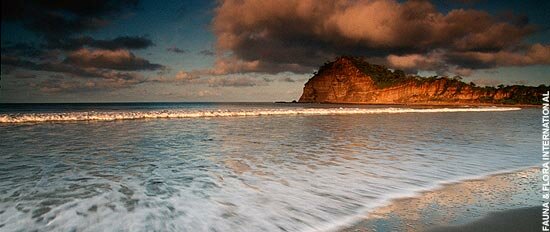
The International Seafood Sustainability Foundation, formed to protect threatened tuna in the Eastern Tropical Pacific, has attacked the Inter-American Tropical Tuna Commission ahead of their latest meeting
And they launched a scathing attack on the Inter-American Tropical Tuna Commission (IATTC) for ignoring scientific advice about overfishing and the damage being done to other species such as dolphins, turtles, sharks and seabirds.
The new pressure group claimed that IATTC, made up of 16 member countries with a mandate to regulate fishing fleets to avoid over-exploitation of tuna in the Eastern Pacific, had held six meetings in the past two years but had failed to take a single decision to help the threatened fish. Continue reading ‘New consortium aims to protect threatened tuna species’

The breeding population of bluefin tuna in the Eastern Atlantic and the Mediterranean has collapsed, in what may come to be seen as one of the world’s most spectacular ecological disasters, according to an independent report.
- The 2008 bluefin tuna dossier - Advanced Tuna Ranching Technologies [pdf of the full report by Roberto Mielgo]
The destruction of stocks of one of the world’s most expensive fish, already recognised as being as endangered as the giant panda, effectively took place in 2007, more than twice the legal catch was taken by Mediterranean fishermen under the eyes of EU and UN-recognised officials, according to the report.
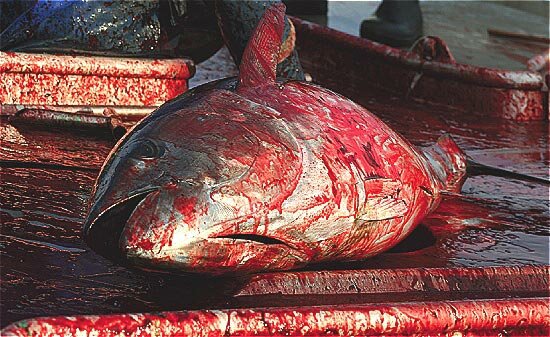
Bluefin tuna image from The 2008 bluefin tuna dossier by Advanced Tuna Ranching Technologies
If the analysis of the size and weight of tuna now passing through the Japanese market is representative of what remains in the sea, according to the report, the EU and other Atlantic nations have presided over disaster comparable to that of the collapse of the blue whale or the Northern cod.
Environmentalists blame the final destruction of what was the largest population of a fish which is known to have been hunted for 7,000 years on a catastrophic failure of governance by the EU and the International Commission for the Conservation of Atlantic Tunas (ICCAT).
Rampant illegal fishing with spotter aircraft, fast power-boats and the full modern hi-tech arsenal of fishing technology has hastened the decline.
A-list diners, including Charlize Theron, Sting and Elle Macpherson signed a letter of protest last week to Nobu Matsuhisa, the world-famous fushion chef, threatening to boycott his restaurants unless he takes the endangered bluefin tuna off the menu.
According to the latest report, released to coincide with World Oceans Day by the independent consultant Roberto Mielgo, 70 per cent of the bluefin tuna in the Japanese market between July 1 last year and May 1 this year were below 90 kilos in weight.
Some 33 per cent of the tunas on the Japanese market were below the legal size of 30 kg when caught – a major indictment of the inspection regime run by Mediterranean countries under the supervision of ICCAT.
Mr Mielgo said: “If this analysis of what is on the Japanese auction markets corresponds to what is left in the sea, we are in deep trouble. It means the adult bluefins are no longer there. If that is what is at sea, the stock will not recoup.
“My view is that the stock collapsed in 2007 as a result of the 2007 fishing season in which 61,000 tons of bluefin were caught. The fishery should have been closed in 2007.”
The 61,000 tons recorded in official catch figures in 2007 was twice the legal quota agreed by EU nations and ICCAT, four times what scientists advised was responsible and six times what ICCAT’s own scientists said was needed for the recovery of the stock.
Ten years ago, the majority of bluefin tuna in the Japanese market were medium-sized mature adults of 120 kgs or more and the stock structure wholly different to what it is now. Now a third of it is below the minimum landing size and causing concern even among Japanese tuna traders who dislike selling small fish.
Mr Mielgo’s report concludes: “The massive presence in the Japanese market of juvenile bluefin tunas having been illegally caught and farmed points to the failure of current control schemes, including the credibility of observers filling in caging declarations.”
Mr Mielgo is a tuna farmer turned whistle-blower. The report by his consultancy, Advanced Tuna Ranching Technologies, goes even further than trends presented earlier this year by WWF using official figures which showed that the population of breeding tuna in 2007 was only a quarter of that 50 years ago.
According to WWF’s analysis, the bluefin breeding population will disappear by 2012 under the current fishing regime. It called for the immediate closure of the fishery.
Mr Mielgo’s report says the age-profile of tunas on the Japanese market “is consistent with the hypothesis of an on-going collapse of the breeding population of this stock.”
He added: “It’s not that I am a pessimist. There is no way this population is going to pick up. Again, I hope I am wrong. The fish are not there.”
Dr Sergi Tudela, head of fisheries for the Mediterranean, said: “Our position in April, based on ICCAT data, is that the spawning stock will have been wiped out by 2012.
“This new data is a further indication of what we said then, which is that the spawners are disappearing. The reproducing stock is in serious trouble. This shows the bluefin is in dire straits.”
Mr Mielgo is featured in the film, The End of the Line, which has its national public premiere in 50 British cinemas tomorrow.

This week has seen a dramatic increase in the coverage for The End of the Line and related fishing issues in the run up to the World Ocean Day Screenings.
Many of the national daily papers have covered the film or the Nobu decision to continue selling bluefin tuna - a subject brought into the spotlight by The End of the Line campaign and Greenpeace.
In an extensive comment piece for The Independent, Johann Hari, asks whether we will be the generation that runs out of fish.
He writes: “In the babbling Babel of 24/7 news . . . the slow-motion stories that will define our age are often lost. An extraordinary documentary released next week, The End of the Line, forces us to stop, and see.”
The Telegraph reports that Sienna Miller, Charlize Theron, Jemima Khan, Woody Harrelson, Laura Bailey, Alicia Silverstone, Zac Goldsmith, Sting and his wife Trudie Styler have jointly written to Nobu asking him to remove bluefin tuna from the restaurant’s menus, so they can “dine with a clear conscience”.
The Sun also carries the story saying: “Sienna Miller blasted a top London restaurant for putting endangered bluefin tuna on its menu.” Continue reading ‘The End of the Line focuses spotlight on celebrity reaction to bluefin tuna on Nobu menu’

This week saw lots of coverage of Nobu’s decision to leave bluefin tuna on their menus, but to include a suggestion that diners choose a sustainable alternative.
The story featured on The Guardian’s Word of Mouth blog, where Jay Rainer labelled it “indefensible idiocy”.
The Telegraph, The Independent, The Daily Mail and This is London carried the story with all mentioning Charles Clover’s book and the film.
This is London followed up their coverage with an opinion piece by Charles Clover, where he said: “[Nobu] is participating in the extermination of a species.
“And when his celeb clientele finally understand that this is wrong, they will turn their backs on his restaurants, never to return.”
Coverage of The End of the Line increased with two articles appearing on The Telegraph. It ran a story on Ted Danson’s endorsement of the film and a review, with both including video clips.
Continue reading ‘Nobu leave bluefin tuna on menu, but add warning’

The celeb-favourite sushi restaurant Nobu is back in the media spotlight this week, but with column inches devoted to bluefin tuna rather than A-list diners.

Greenpeace activists give out leaflets outside Nobu protesting against the restaurant selling bluefin tuna
As Greenpeace revealed last year, Nobu, who pride themselves as market leaders and an exclusive venue, were serving up bluefin tuna as sushi.
Bluefin is an endangered species, like rhinos, tigers, or gorillas, and after it was pointed out to them last September (although the species had been on the IUCN red list of endangered species for 12 years, had they bothered to check), they gave assurances that they would do something about it.
But sadly it seems Nobu can’t be bothered. They know they are serving up endangered species, and helping to push them towards extinction, but profit comes first, right? Continue reading ‘Robert De Niro, what are you waiting for?’

- Howard Wood is the chairman of COAST - Community of Arran Seabed Trust
I have battled and campaigned against the short sightedness of Government fishing policy for 15 years. In September 2008 Scotland got its first, small no take zone in a part of Lamlash Bay off the Isle of Arran. The rest of the Bay was to be designated a Marine Conservation Area but it has not happened yet.
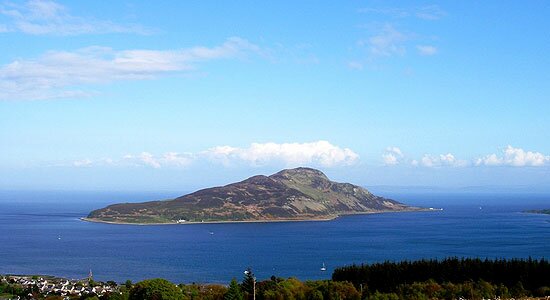
Lamlash Bay, Isle of Arran, where a no take zone has been established
This despite the entire project, Lamlash Bay Community Marine Conservation Area, being trumpeted through the press in January 2008 by Richard Lochhead, SNP Minister, as an excellent joint Community, Government & Fishermen project.
The inertia appears to be due to Mr Lochhead and civil servants worrying about upsetting the trawling & dredging fishing industry.
The Clyde Fishermen’s Association walked away from talks to implement the scheme in January 2009 and thereafter Marine Scotland, the department that overseas the marine environment, has refused to allow the Marine Conservation Area to even appear on the agenda of meetings.
Subsequent meetings have been cancelled or postponed. Procrastination is the name of the game. Continue reading ‘Change of government fishing policy is possible, but very difficult’

Environmental protection groups have launched an 11th hour bid to get better legal protection for marine life around Britain’s shores.
They will be protesting in Westminster today as the new Marine and Coastal Access Bill completes its passage through Parliament.
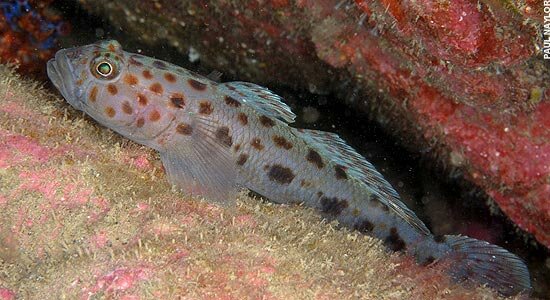
Leopard spot goby in waters off the British coast
The groups say it will be the last chance to insert tougher measures into the Bill which will guarantee protection for the most important areas in the marine environment.
The RSPB, The Wildlife Trusts, the Marine Conservation Society and WWF have been campaigning for comprehensive legislation for almost a decade.
They claim the current proposals are too weak and won’t prevent the steady decline of many marine species and habitats in UK waters due to over fishing and industrialisation. Continue reading ‘Marine Bill: Environment groups launch 11th hour bid for better protection’

No, this is not another story about the crazy things we feed to our farm animals, but rather yet another sad tale of failure in fisheries management … and yet another nail in the coffin for bluefin tuna in the Mediterranean.
Quite apart from the fact that ICCAT (the body responsible for managing fish like bluefin tuna) has been repeatedly denounced as not fit for the job (specifically it was called an ‘international disgrace’ last year); and aside from the politicians having yet again set quotas for bluefin tuna in excess of the scientists recommendations; skipping over the issue of rampant illegal fishing for this species; and parking the small issue of this being an endangered species… Turkey has just unilaterally set itself a quota for bluefin, breaking international commitments and sticking two fingers up at any coordinated attempt to manage the species across national boundaries.
This is on top of a Greenpeace investigation revealing that between 5 and 10 tonnes of juvenile bluefin tuna had been landed in a Turkish port.
Now, as we know, fish (and other animals) don’t respect national boundaries, so in theory some international cooperation is a good idea when it comes to looking after these animals. Right? You’d think. But in true tragedy-of-the-commons style, that is often scant comfort for things that live in the ocean. Fish are horse-traded against other political issues, and compliance and enforcement is, well, variable to say the least.
But think for a moment, to what might happen if bluefin tuna were not a fish, but a land animal, like the similarly endangered rhino, tiger, or gorilla … would this be allowed to happen?
Maybe bluefin are just not cuddly enough, and a little too tasty – but they are amazing animals. This is one of the reasons why bluefin are the tragic stars of the new movie, The End Of The Line. If they were mammals they might be admired for their size (like elephants), speed (like cheetahs) or their place as a top predator (like tigers).
Sadly – they are more likely to be appraised only for the amount of dollars or yen they fetch at market. Of course this is scandalously short-sighted, and our collective greed and disregard is pushing the species towards extinction.
The people in charge of ‘managing’ bluefin tuna have failed – it’s time for a new approach, and for the species to be treated as it would be if it were an endangered animal on land. And with politicians and fishermen unwilling to do the right thing, it’s time for consumers and suppliers to take a stance.
So it’s up to the big players like Nobu, who serve up bluefin as sushi to celebrity diners, and Mitsubishi, who are the biggest traders in bluefin in the Mediterranean.
Not only should we all be avoiding bluefin on our menus, but also demanding our politicians take action to turn things around, and hopefully rescue the species from the abyss. The first step in the Mediterranean would be a ban on fishing all bluefin until such time as the management and enforcement was sorted out, and in setting aside areas where we know bluefin breed as protected Marine Reserves.
Otherwise, it might well be the end of the line for an iconic ocean species.

A row over scallop-dredging in Cardigan Bay has escalated after fisheries regulators ignored a demand by the Welsh Assembly’s wildlife advisers for an immediate and total ban in areas protected by European conservation legislation.
The call by the Countryside Council for Wales (CCW) for all scallop-dredging authorisations to be suspended pending completion of investigations into threats to wildlife followed a formal complaint to Brussels by four conservation groups, who accused the UK and Welsh governments and fisheries regulators of defying EU law by failing to stop scalloping-boats disturbing dolphins and seals and damaging or destroying their habitats and breeding sites.
The CCW is now effectively backing that line, saying that current dredging is breaking European wildlife-protection legislation.
CCW regional manager Tim Jones told the Lancaster-based North Western and North Wales Sea Fisheries Committee, which has responsibility for policing sea areas up to six miles from land, that the risk of damage to dolphins’ and seals’ habitats “may be imminent”, and that there was an “urgent” need for the committee to act.
The warning came just a month before the current scallop-dredging season in Cardigan Bay, which began in October, ends on 31 May.
But, in a response which is likely to exasperate the CCW, Stephen Atkins, the committee’s chief executive, made clear this week he was not prepared to intervene immediately to stop the dredging, which churns up the seabed and is widely recognised to be a very destructive method of gathering a highly valuable catch now classed as a luxury food.
He said: “Dredges do damage lots of types of seabed, but I am not prepared to pre-empt any decision by the committee, which does not meet next until 12 June.
“Officers do have delegated powers to take emergency action, but they are not terrifically explicit, and I would rather have committee support.”
Under a legally-backed precautionary regime within the EU Habitats Directive supposed to safeguard Cardigan Bay’s two special areas of conservation (SACs), authorities are obliged to act if there is even a well-founded suspicion that activities such as scallop-dredging could damage SACs.
But Dr Atkins said: “The trouble is the precautionary principle is a vague term, and we don’t really know how we define it.”
Some parts of the Bay’s northern and southern SACs have been closed to scalloping. But the concerns of CCW and conservation organisations including Friends of Cardigan Bay and the Whale and Dolphin Conservation Society
centre on about 45 square miles of theoretically protected waters off an area stretching from New Quay to Cemmaes Head known to be heavily used by bottlenose dolphins.
The tone of the letter from the CCW, which in the past has been criticised for being weak on marine protection, is uncharacteristically hard-hitting, accusing the fisheries committee of “deficiencies” in its approach “to the assessment of the potential impacts on the fishery.”
It says an assessment of environmental impacts underpinning current scallop-dredging authorisations contains weaknesses and is four years out of date, and that it is concerned that dredging currently allowed in Cardigan Bay and Pen Llyn a’r Sarnau SACs is illegal under the terms of the Habitats Directive.
The CCW has sent a similar letter to the Assembly government, which is responsible for sea areas beyond six miles from shore.
Rural affairs minister Elin Jones repeatedly refused to comment directly on the call for an immediate halt to dredging, although the bulk of scalloping tends to take place in offshore areas the government – not the fisheries
committee - is supposed to regulate.
A spokeswoman said: “The minister called in February for a review of the current restrictions for scallop-dredging in response to increasing concerns over the level of fishing in Cardigan Bay.
As part of that process the minister has asked Assembly government officials to work closely with key stakeholders including the CCW and sea fisheries committees to consider the management and sustainability of scallop-fishing in Wales.
“The working group is considering whether the management of this fishing can be further improved and if there is a need to bring forward more effective controls in the future for this fishery.”
The fisheries committee came under further pressure in a letter from Ceredigion Liberal Democrat MP Mark Williams, who asked why it had not followed CCW’s advice and suspended all scalloping.

Earlier this month, I went to Brussels for a private screening of our film, The End of the Line, and debated the sad state of Europe’s fisheries with Joe Borg, the Commissioner for Maritime Affairs and Fisheries.
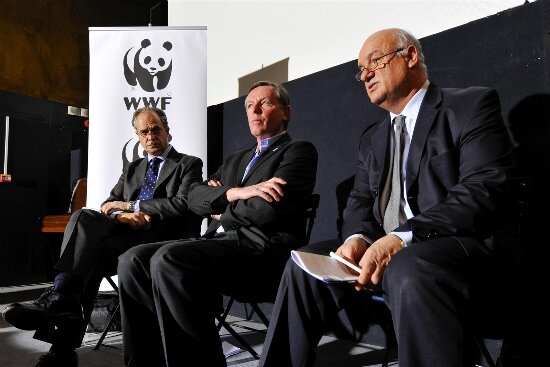
Charles Clover, Tony Long of WWF and Joe Borg, Commissioner for Maritime Affairs and Fisheries, debate Europe’s fisheries policy after a WWF screening of The End of the Line
The screening had been organised by WWF for members of the European Commission and country representatives ahead of the publication of the Green Paper on the reform of Europe’s fisheries policy last week.
I was surprised and impressed by two things. First, the openness and dedication with which Commissioner Borg trotted along and watched an 82-minute film and debated its conclusions, especially since these are even more damning about Europe’s management of its fish stocks than the Commission’s own Green Paper – which admits that 90 per cent of Europe’s fish stocks are overfished.
Continue reading ‘Nice reforms Mr Borg, but aren’t you missing something?’

Europe’s fishing policy has failed and nearly nine tenths of its fish stocks are overfished, the European Commission has admitted.
The Commission published a Green Paper proposing radical reforms of the Common Fisheries Policy (CFP) and began an open debate on the proposed measures which will last until the end of this year.
Among the proposals are:
- A ban on the “discarding” of under-sized and unmarketable fish at sea.
- Making the ecological sustainability of fish stocks the paramount objective of European policy, on which economic viability depends, rather than a factor to be weighed off against the survival of the fishing industry, as it is at present.
- Devolving decisions on the management of fisheries closer to the people they affect.
Continue reading ‘EU admits nine tenths of fish stocks are overfished’

With concern over bluefin tuna stocks growing among environmental groups, we round up the latest news at the start of the Mediterranean bluefin tuna fishing season.
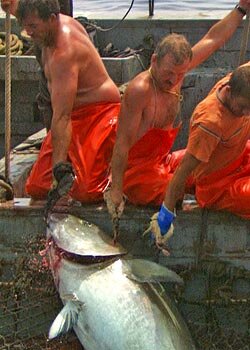
A large tuna is caught by fishermen
Reuters report that a new WWF report says overfishing is set to wipe out bluefin tuna in three years.
The news agency says: “Overfishing will wipe out the breeding population of Atlantic bluefin tuna, one of the ocean’s largest and fastest predators, in three years unless catches are dramatically reduced, conservation group WWF said.
“As European fishing fleets prepare to begin the two-month Mediterranean fishing season, WWF said its analysis showed the bluefin tuna that spawn - those aged four years and older - will have disappeared by 2012 at current rates.”
Sergi Tudela, head of fisheries at WWF Mediterranean, said: “For years people have been asking when the collapse of this fishery will happen, and now we have the answer.” Continue reading ‘Bluefin tuna fishing season starts in the Mediterranean’

One of the world’s rarest sharks has been eaten after being accidentally caught in fishing nets in south-east Asia.
Only 40 other sightings of the shark have ever been recorded, according to the World Wildlife Fund.
The 500kg, four metre megamouth shark died while struggling in the fishermen’s net on 30 March off Burias island in the central Philippines. Read more at Guardian Environment.

Supermarket giant Sainsbury’s has re-named a type of fish Colin because customers are too embarrassed to ask for pollack.
The chain is promoting the seafood in the run up to Easter, as it tastes similar to cod and is more sustainable.
But instead of the English name, it will be called Colin - the French word for hake, another member of the cod family. Read more at Telegraph Earth

The humble sea cucumber is under increasing threat worldwide, a new report warns.
- Sea cucumbers: a global review of fisheries and trade - UN FAO report
- UN FAO
Increasing demand for the cucumber – once a cheap and staple food of the poor, but now fashionable in expensive restaurants – is piling pressure on already depleted stocks.
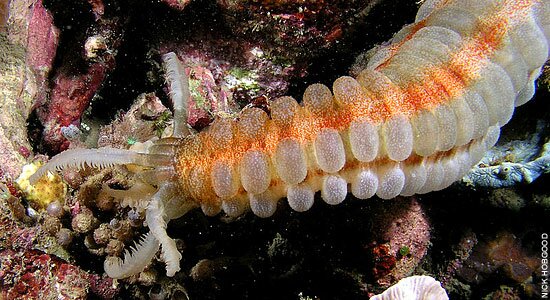
Sea cucumber feeding at night off the Indonesian coast
The UN’s Food and Agriculture Organisation (FAO) warns in its report that sea cucumber populations across the globe, from Asia to the Galapagos, are in trouble and most high value commercial species are already depleted.
In a majority of countries looked at by the FAO and in the African and Indian Ocean regions, stocks are overfished. Similarly, in the Asian Pacific region the most sought-after species are largely depleted. Continue reading ‘UN report: Sea cucumbers face overfishing threat’


![]()









